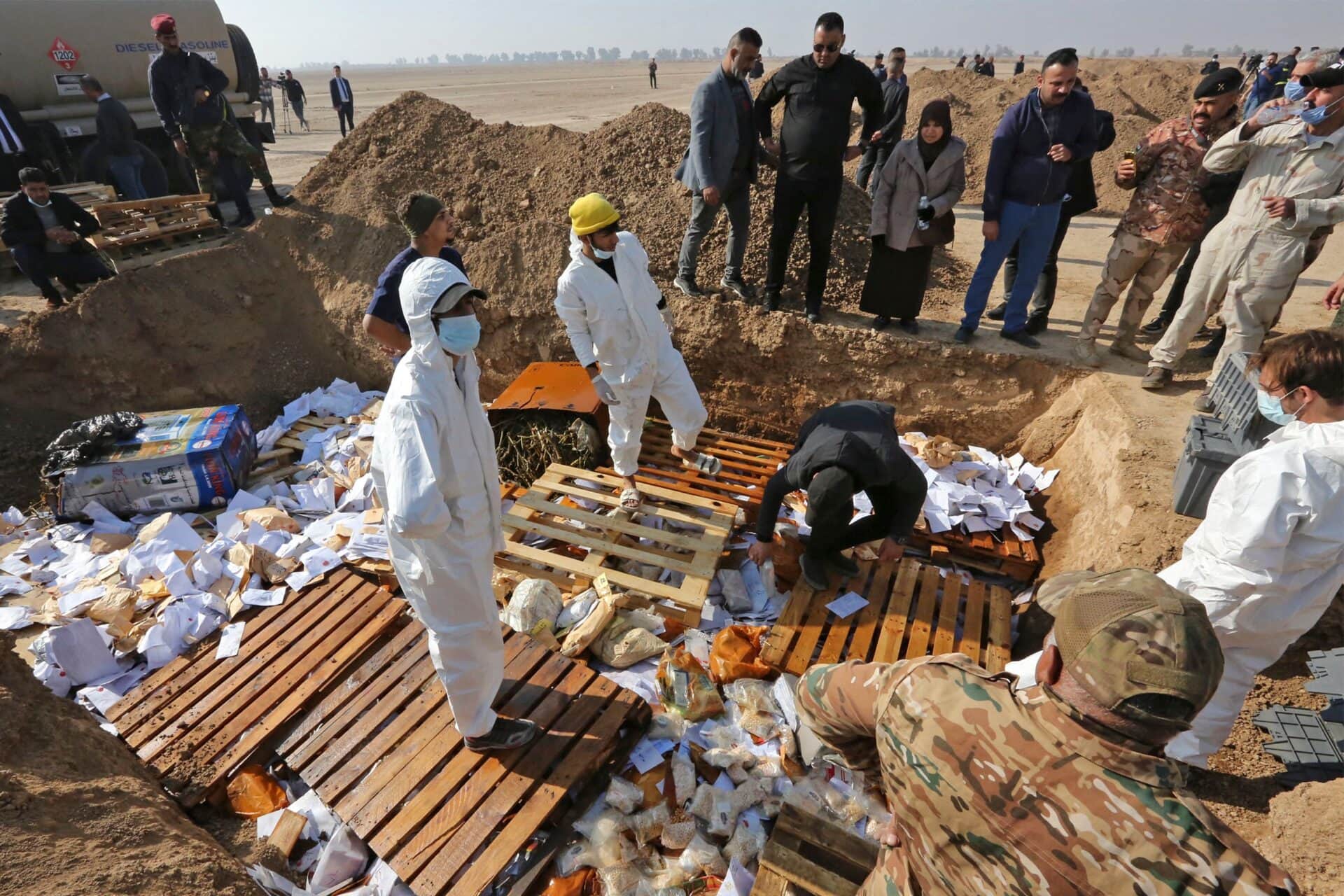Introduction
As Iraq’s role as a transit route and burgeoning production site for amphetamine-type stimulants has grown in the last two years, the country is rolling out a string of initiatives that seek to crack down on illicit trades like captagon and crystal meth while demonstrating regional leadership on counternarcotics. Iraqi security and police forces have conducted a surge of seizures and arrests of drug traffickers and dealers in the last two months, particularly against those smuggling captagon in governates such as Anbar. The federal government also held its second iteration of a counterdrug regional summit on July 22, where Prime Minister Mohammed Shia Al-Sudani and Interior Minister Abdul Amir al-Shammari unveiled a list of broad principles and commitments to leading regional cooperation against illicit drug trades and the criminal networks behind them. The most notable byproduct of the regional summit was a new National Drug Control Center to be headquartered in Baghdad.
The facility, which will have a mission of intelligence exchange and collaboration among regional neighbors afflicted by surging illicit drug flows, is an answer to long-held calls for greater, sustained regional counternarcotics cooperation. For years as supply and demand of stimulants in the Middle East has surged, countries’ responses have largely been unilateral, siloing broader cooperation. Only occasionally have regional players, such as Jordan, ventured out to forge multilateral initiatives, such as dialogues or working groups, that have produced short-term wins like tip-offs for seizures or busts against a particular criminal syndicate. However, these instances of cooperation have often been short-lived, and the region lacks a sustainable, structured counternarcotics mechanism.
While recent Iraqi efforts for regional collaboration represent a step in the right direction, the approach contains a key vulnerability that could seriously disrupt progress made against illicit synthetic drug flows in the Middle East: the inclusion of the Syrian regime. Bringing Bashar al-Assad’s government, a known sponsor of industrial-scale production of drugs like captagon, into the fold of intelligence-exchange efforts threatens genuine progress against illicit drug production, distribution, and consumption. Instead, Iraq, with the help of the U.S. and other partners, should seek to protect its new regional mechanism, modifying its approach to both test the Syrian regime and limit Damascus’ role in region-wide intelligence exchange.
Iraq’s New Counternarcotics Approach
During summer 2024, there was a noticeable uptick in seizures and arrests against drug traffickers in Iraq, particularly related to the captagon trade. After a slight lag in seizures in the spring and early summer, according to the New Lines Captagon Trade Project’s Comprehensive Seizure Database, Iraq’s security, customs, and police forces conducted a surge of interdictions and busts in July and August, with the large majority in Anbar governate. Along with seizing millions of pills, Iraqi security forces arrested several accused dealers and busted criminal networks, many of which were described as “international” syndicates.
Iraq’s Interior Ministry stated that over 230 domestic and international networks operating in Iraq were disrupted in the last three years, with over 28 tons and millions of pills of drugs seized by the General Directorate of Drug Affairs. The sudden increase in interdictions likely demonstrates either an increase in the use of Iraq’s tristate border with Syria, Jordan, and Saudi Arabia for trafficking drugs or increased monitoring and counternarcotics resourcing from the Iraqi federal government.
As captagon smuggling operations have shifted from large-scale maritime shipments to smaller-scale, overland shipments, Iraq has become a natural target for illicit drug trafficking. The country’s proximity to other transit routes such as through Jordan and Türkiye and its 504-mile-long border with the region’s top destination for amphetamine-type stimulants, Saudi Arabia, make it a shortcut for criminal actors seeking new pathways to consumer markets without having to divert flows outside of the region. While traffickers have often relied upon routes through Jordan to reach the Gulf, increased Jordanian attention and capacity against smugglers – resulting in a deadly series of smuggling operations and strikes on drug kingpins – has likely incentivized traffickers to look to Iraq as a gateway to demand hubs.
In July 2023, Iraqi authorities conducted a bust on the first identified laboratory for captagon in the country, along the Iraqi-Saudi Arabian border in Muthanna province. The bust proved to authorities that criminal agents were indeed targeting Iraq not only as a transit site but also for small-scale production. Additionally, Iraq’s existing role as a transit route for precursors and finished illicit drugs from Afghanistan, Iran, and Pakistan, combined with rising domestic demand for synthetic drugs like crystal methamphetamine, make the country attractive for drug smugglers seeking to expand their footprint. Rampant corruption in Iraq’s justice, security, and police systems, checkpoint economies controlled by militia networks competing with state forces, and blind spots in rural, hard-to-reach border areas prime the country as a highway for traffickers to reach their clientele.
Iraq also is a growing destination market for synthetic drugs. Crystal methamphetamine, commonly known to Iraqi consumers as “shabo,” is the most popularly consumed illicit drug in Iraq, with captagon, referred to on the Iraqi black market as “zero-one,” the second. The Interior Ministry estimates that in underprivileged areas of the country, crystal meth consumption represents 37.3% of drug consumption, with captagon consumption at 34.5%. Rising consumption and dependence levels on illicit drugs and psychotropic substances in Iraq – particularly synthetic amphetamine-type-stimulants – have raised alarm among Iraqi governmental agencies and community leaders.
Grand Ayatollah Ali al-Sistani’s office released a fatwa in response to a series of inquiries about the consumption, trade, and production of drugs. The fatwa branded all drugs and their revenues as forbidden by Islamic law, with the exception of drugs for medicinal use, called for the boycott of those who smuggle or trade in drugs, and requested that negligent officials who fail to counter illicit drug trades to resign as they commit a “double sin.” The fatwa also served as a shift in long-standing stigmatization of drug consumption and public awareness, calling for educational efforts to demonstrate the implications of drug use and promising drug-dependent individuals repentance if they complete drug rehabilitation programs.
Experimenting With Regional Leadership
In an effort to translate regional leadership in other forums, such as brokering an Iranian-Saudi rapprochement, into counternarcotics and respond to an increase in illicit flows in the Middle East, Iraq has begun to encourage greater regional coordination against illegal drug trades. Building off trilateral and quadrilateral working groups led by the government of Jordan in the spring of 2023 and winter of 2024, Iraq has initiated the Baghdad International Conference on Countering Narcotics, convening eight countries across the region in two summits. In May 2023, Baghdad hosted the police chiefs and interior ministers of Egypt, Türkiye, Lebanon, Iran, Jordan, Kuwait, Saudi Arabia, and Syria to discuss regional coordination in disrupting drug manufacturing, transnational supply chains, and the criminal syndicates involved. The Iraqi Prime Minister’s Office hosted the dialogue’s second iteration this past July, highlighting the destabilizing role of illicit drug trades for society, public health, national security, and justice systems.
The second dialogue, much like the first, sought to shine a light on illicit drug flows and deepen regional counternarcotics cooperation on consumption, production, countering drug gangs, identifying trafficking routes, coordinating extradition, and reviewing demand and supply levels. Joined by a delegation from the United Nations Office on Drugs and Crime, regional police chiefs and interior ministers met for two days to review recent statistical trends in drug trafficking and consumption and synergize potential avenues for coordination. The summit’s slogan referred to Iraq’s effort to reenergize a collaborative spirit amongst regional neighbors: “Through cooperation and unity of purpose, we eliminate drugs.”
The second iteration of the counterdrug summit saw the announcement of a new national counterdrug coordination center. While not much is known about how the coordination center will function outside of the fact that it will be headquartered in Baghdad, the inclusion of the summit participants – Egypt, Iran, Jordan, Kuwait, Lebanon, Türkiye, Saudi Arabia, and Syria – signals how Iraq is capitalizing upon momentum achieved through recent (though limited) regional dialogue.
Implications of Including Syria
Despite the surge in new and evolving synthetic drug trades in the region, such as captagon, regional governments have siloed their counternarcotics operations, opting out of opportunities for intelligence exchange due to regional rivalries or distrust. Occasionally, law enforcement agencies have shared actionable information that have led to tip-offs, such as collaboration between Saudi Arabia and Lebanon and intelligence exchanges between Saudi Arabia and Malaysia that produced large-scale drug seizures. Regional actors have also convened off-and-on trilateral working groups to coordinate on counternarcotics, such as a series of ad hoc meetings led by the Jordanian government with Iraq, Syria, and Lebanon. Iraq’s inclusive approach is an attempt to fill a key gap in counternarcotics and satisfy growing demand for a region-wide mechanism for the illicit drug challenge.
However, the presence of the Syrian regime at regionwide dialogues and coordination frameworks represents a key flaw in Iraq’s approach and risk to future success. Assad family allies embedded in Syria’s private agricultural, shipping, telecommunications, and industrial sectors have sponsored industrial-scale production and trafficking of captagon, along with systematic involvement from the Syrian regime’s security arm, the 4th Division, and its partner Hezbollah. Regime-aligned businessmen and security officials have utilized the trade as a source of alternative revenue: an estimated $2.4 billion per year. The trade has also served geopolitical interests for the regime as well; by initiating an overspill of illicit narcotics and kinetic – occasionally fatal – smuggling operations onto its neighbors, Syria has molded a key bargaining chip to wield in regional normalization discussions. And despite limited pressure from counterparts like Jordan and Saudi Arabia to reduce its role in the trade, the Syrian regime holds all the cards, conducting occasional cosmetic seizures while still supporting large-scale production and trafficking.
The inclusion of Syria in regional counternarcotics efforts is not new. In June 2022, Interpol held a regional meeting in the United Arab Emirates for to enhance interdiction efforts under Operation Lionfish, which Syrian regime representatives attended. Jordan has also led counternarcotics working groups that have included the Syrian regime, along with Iraq, Lebanon, and later Egypt, since spring of 2023. Iraq has also initiated bilateral counternarcotics initiatives with the Syrian regime directly, with the two countries signing a cooperation memorandum for border control, drug trafficking, extradition, organized crime, and money laundering in Baghdad on May 12, 2024.
Policy Recommendations
One-on-one engagements with the Syrian regime could be strategically used by regional actors to test what intelligence on criminal networks, illicit production, trafficking routes, and other information it is willing to share. Jordan has used this approach in the past, engaging with the regime and comparing whatever intelligence is exchanged with its own sources, then using any disparity or lack of coordination with the regime as a bargaining tool. This approach was put on full display this last winter, when Jordan’s Foreign Ministry responded to Syrian condemnations over a strike Jordanian armed forces conducted against drug kingpins in southern Syria, stating that Syrian inaction on information provided about trafficking networks offered them no choice but to act on their own intelligence.
It may be useful for the Iraqi government to utilize its 2023 memorandum with Syria to gauge what intelligence Damascus is willing to offer, compare it with their own, and pressure the regime when it fails to take action against networks identified through joint efforts. However, engaging the regime in broader, regionwide counternarcotics dialogues and frameworks will strengthen Damascus’ bargaining position and give it the ability to glean actionable intelligence that can help its aligned illicit networks, rather than hurt them.
The U.S. should work with the Iraqi government to identify alternative routes for regional collaboration that do not create new opportunities for the Assad regime and its sponsored criminal networks. Washington should welcome Iraq’s Anti-Drug Summit series and work with Baghdad to improve momentum for regional exchange, with a keen focus on addressing both supply and demand. The U.S. Department of State’s International Narcotics and Law Enforcement (INL) Bureau should consider working directly with the Iraqi government and other regional stakeholders heavily impacted by amphetamine-type stimulants, such as Jordan, to expand programming under the Global Coalition Against Synthetic Drugs that was established last year. Under the umbrella of the Global Coalition, INL, the Iraqi federal government, and partners can create a series of working groups specifically tailored to focus on amphetamine-type stimulants and their associated criminal syndicates, precursor supply routes, locations of laboratories and storage houses, methods of production, smuggling routes, drugs’ chemical profile and health implications, and data on consumption rates.
Furthermore, U.S. law enforcement and security agencies should identify routes to support Iraq’s newly established National Drug Control Center by pivoting the center away from active intelligence exchange, if it is to include the Syrian regime. Instead, the U.S. should encourage Iraq and its partners to lead other collaborative efforts that focus on demand reduction strategies and access to rehabilitation, rather than focusing on interdiction capacity and thus arming the Syrian regime with actionable information that could improve aligned criminal groups’ resiliency. Additionally, the U.S. and partners such as the EU should additionally seek ways to work with Iraq to achieve routine testing on seized illicit synthetic drugs, offering laboratory facilities and expertise for chemical analysis.
Caroline Rose is a Portfolio Director at New Lines. Her commentary and work on geopolitics and Middle Eastern affairs have been featured in Foreign Policy, The Independent, Alhurra, Limes Magazine, and the Atlantic Council’s MENASource. She tweets at @CarolineRose8.
The views expressed in this article are those of the author and not an official policy or position of the New Lines Institute.






